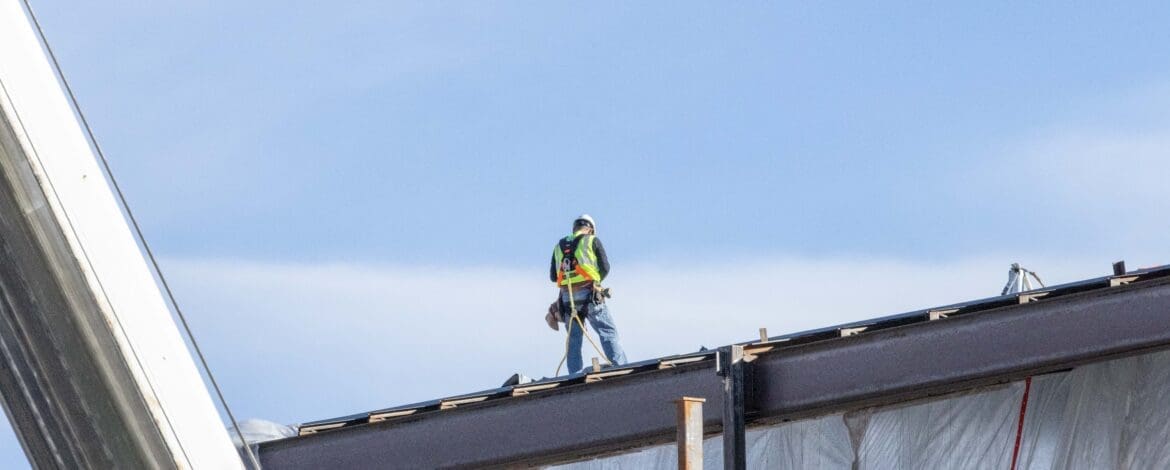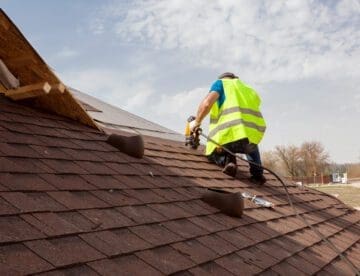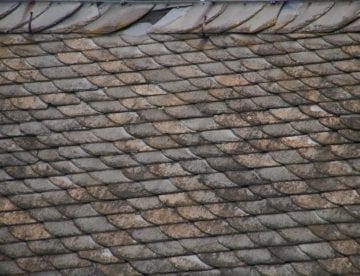Choosing the right commercial roofing materials is vital for your business premises. A well-installed proper roofing system using the best materials can improve energy efficiency and protect your property from the impact of storms and hurricanes—something all businesses in Tampa Bay, FL, are concerned about. But how do you know which type of commercial roofing material is right for your business?
Commercial roofing performs the same function as residential properties—to protect the property from the elements. However, roofs on commercial buildings are typically flat or have slightly sloped roofs. Therefore, choosing the right materials is vital. For example, commercial roofing materials in Florida must endure constant sunshine, intense heat, humidity, and stormy weather.
This article explores the types of commercial materials available for businesses in the Tampa Bay area. You will also learn about factors that can impact your decision. These are energy efficiency, budget, maintenance, and selecting the right commercial roofing contractor.
Types of Commercial Roofing Materials
One of the most common commercial roofing materials is Ethylene Propylene Diene Monomer (EPDM). This type of rubber roofing material is resilient and affordable to install. Other materials used in commercial roofing systems include metal, thermoplastic PVC and TPO, spray-on silicon, green roofing, and shingles.
Choosing between the roof coatings to find the best for your business can be challenging.
Here are some pros and cons of the most popular types of commercial roofing materials for businesses in Florida.
TPO Roofing for commercial buildings
Thermoplastic polyolefin (TPO) roofing is a popular roofing material option for businesses in Florida. A TPO roof is budget-friendly and easy to install compared to other roofing systems. In addition, TPO roofing is energy efficient and can form part of a “cool roofing system.”
One of the things to consider is that the technology is relatively new. That is why you should find a local roofing contractor in Florida with expertise in TPO roofing systems.
EPDM Roof Coating
EPDM roofing systems are common in Florida because they are long-lasting, cost-effective, and eco-friendly. Also, if you choose white EPDM materials for a commercial building, you can cut energy costs.
A consideration of EPDM roofing materials is that installation costs can be higher than other systems. Additionally, non-reinforced EPDM is less durable in Florida’s climate and can be subject to shrinkage.
Metal Roofing
Metal roofing on commercial buildings can be one of the most durable materials. A metal roof can withstand severe hurricanes and don’t split, warp, dry out, or chip. And because the roofing materials have interlocking panels, they have excellent water and wind resistance.
Another advantage is their energy efficiency due to their reflective properties. In some cases, businesses can save up to 40 percent on cooling costs during hot southern summers.
However, there are a few downsides to metal roofs. First, they are costly to install and are prone to corrosion. And second, they can be noisier during hard rain.
PVC Roofing
Many businesses in Florida choose PVC roofing because of its resistance to high winds and water. Additionally, commercial roofing systems using PVC have a long service life. They are one of the most durable types of roofs.
A consideration of PVC roofing is its high cost. And if you are replacing a roof, the contractor must remove the old roof, adding to your expenses. Also, older PVC roofs are difficult to repair.
Silicone Roof Coating Systems
Using silicone as a commercial roofing material has its pros and cons. First, silicone is good for flat roofs because it is resistant to ponding water and endures tough weather conditions. Also, white silicone reflects UV rays, making it an ideal “cool roof” solution.
However, silicone tends to get dirty easily, making it a high-maintenance commercial roof. And if you need foot access to the roof, silicone is extremely slippery in high humidity or wet conditions.
Comparing Commercial Roofing Material at a Glance
| UV Reflective | Durability | Maintenance | Fire-Resistant | Cost $ (per sq. ft.) | Life Expectancy (max.) | |
| TPO | ✓ | High | Low | ✓ | 3 – 9 | 25 years |
| PVC | ✓ | High | Low | ✓ | 5 – 12 | 30 years |
| EPDM | ✗ | Medium | Low | ✓ | 4 – 10 | 30 years |
| Metal | ✓ | High | Low | ✓ | 3 – 6 | 50 years |
| Silicone | ✓ | Low | Medium | ✓ | 5 – 8 | 40 years |
| Modified bitumen | ✗ | High | Low | ✓ | 5 – 12 | 20 years |
| Built-up roofs | ✗ | High | High | ✓ | 6 – 14 | 50 years |
Factors to Consider When Choosing Commercial Roofing Materials
When choosing commercial roofing materials, there are a few important factors to consider. Apart from cost, energy efficiency, maintenance requirements, and durability are things to consider. Each of these factors can influence your choice and budget restraints.
Here are a few things to consider:
- Energy efficiency — A commercial roofing system that is well insulated and reflects the sun’s rays will help cut energy bills. One study showed that cool roofs could lower internal ceiling temperature by up to 9°F, saving 190 kWh/m2/year.
- Durability — Flat roofs or low slope roofs are prone to water pooling. Therefore, the roofing materials must be highly resistant to excess moisture and puddles of water. Additionally, most commercial building roofs require contractors to service equipment. And so, the materials must be slip-resistant.
- Maintenance requirements — Maintenance is vital to extend the lifespan of your roof. For example, some materials like silicone require recoating every ten years for a lifespan of up to 40 years. Also, some materials like PVC and EPDM are prone to shrinkage and can be difficult to repair.
Energy Efficiency and Environmental Benefits
Commercial roofing materials can make a real difference regarding energy efficiency and environmental benefits. Cool roofs, for example, reflect sunlight away from the building and help keep temperatures lower in hot climates. This not only reduces cooling costs but also helps lower the urban heat island effect.
Another way your business can reduce its carbon footprint is to install a green roof. This type of commercial roofing material incorporates grass or shrubs into the roof design. Not only do green roofs provide insulation and energy efficiency benefits, but they also add aesthetic appeal to a building and have positive environmental impacts.
A study into the benefits of installing a green roof in a commercial building highlighted the following:
- Reduce cooling loads
- Prevent excessive storm-water runoff
- Mitigate urban heat island impact
- Capture carbon dioxide
- Create wildlife habitats in cities
- Reduce noise in buildings
Related reading: The most energy-efficient roofs in Florida.
Budget Considerations
Budget is a major factor when considering the best commercial roofing materials for your business. However, it’s not only the cost of materials, labor, and installation. It’s vital to consider the long-term benefits and maintenance costs of each option.
For example, TPO commercial roofing is a cost-effective solution without compromising durability. However, in areas prone to hurricanes, metal roofing may be a more durable option despite its initial higher price point when compared to PVC roofing.
Choosing the Right Commercial Roofing Contractor
A commercial roofing system is only as good as the contractors who installed it. So, choosing the right commercial roofing contractor is key for your new roof project.
What should you look for when hiring a contractor? Here are a few tips:
- Get referrals from people you know or look for authentic online reviews.
- Ensure the contractor only uses the best quality roofing materials available.
- Check the number of years the roofing contractors have been in business.
- Ensure the contract includes lengthy warranties. For example, Code Engineered Systems offer 25-year labor and 50-year material warranties backed by GAF.
Conclusion
Choosing the right commercial roofing materials for your business is a crucial decision. It’s crucial to consider your budget, climate, required durability, and maintenance costs to make an informed decision. Then, you can be sure that — with the right materials and a reliable contractor — you can have a strong, durable roof that will protect your business for years to come.
If you are looking for a commercial roof replacement or new installation, please contact Code Engineered Systems today. A team member is ready to discuss your requirements and provide a free, no-obligation quote.
Additional Resources
Here are some helpful resources on commercial roofing materials.
- The benefits of cool roofs
- The EPA’s advice and cost estimates on how green roofs can reduce heat islands
- How to qualify for tax deductions for commercial roofing projects
- The importance of using a commercial roofing contractor who installs GAF roofing




